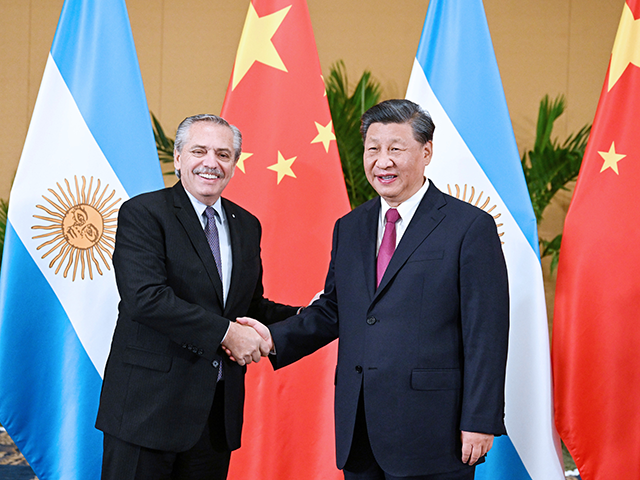China has agreed to expand its currency swap deal with Argentina by $5 billion following a meeting between Communist Chinese dictator Xi Jinping and Argentina’s leftist President Alberto Fernández held during the Group of 20 (G20) summit in Bali on Tuesday.
“Today the Chinese government informed us that it authorized Argentina to freely dispose of the five billion dollars,” President Fernández said at a press conference on Tuesday alongside Argentine Chancellor Santiago Cafiero and Economy Minister Sergio Massa.
“For us, this is great news that we are deeply grateful for,” Fernández continued. “In addition, he [Xi] explained to me that it is an absolute exception that China makes towards Argentina and that is how we take it and that is how we appreciate it.”
Fernández had been hospitalized in Bali after falling ill with gastritis and briefly losing consciousness, which forced the Argentine president to miss the first day of the G20 summit. While Chancellor Cafiero and economy minister Massa represented the South American nation at the G20’s activities on Fernández’s absence, the president’s medical team cleared him to conduct his meeting with Xi Jinping.
Argentina, which officially joined China’s predatory Belt and Road Initiative (BRI) in February, will use the $5 billion swap to boost its Central Bank’s dwindling foreign currency reserves. According to sources within the Argentine government, the agreement will be formally finalized in the next 30 days.
Prior to the $5 billion expansion announced on Tuesday, Argentina already had an active 130 billion Chinese yuan ($19.57 billion) currency swap with China that accounts for 54 percent of the Central Bank of Argentina’s gross reserves.
The meeting between Xi and Fernández occurred within the framework of the “Year of Friendship and Cooperation between Argentina and China” that both countries established on the occasion of the 50th anniversary of diplomatic relations.
At the joint press meeting, Massa stated that China’s swap expansion represents “having five billion [United States] dollars more in the Central Bank’s reserves to strengthen our currency. In such a way that this not only enlarges, but also increases, the capacity of action in the single free exchange market of the Bank.”
Argentina’s dwindling reserves, which the International Monetary Fund estimated at around $4.8 billion, and the plummeting exchange rate value of its currency, the Argentine peso — which, as of the time of publishing, is 162.12 pesos per American dollar — has prompted the nation to adopt a convoluted multi-tier currency exchange system. The newest exchange rate system to debut is named the “Qatar dollar,” in honor of the upcoming 2022 FIFA World Cup, and incurs surcharges of up to 25 percent that seek to discourage U.S. dollar spending by Argentine citizens that engage in foreign tourism.
According to the office of the president of Argentina, the Casa Rosada (Pink House), China’s debt to Argentina to continue construction of the Néstor Kirchner and Jorge Cepernic dams in Santa Cruz province was another subject discussed during the bilateral meeting. Between 2014 and 2021, China disbursed $1.35 billion out of the $4.714 billion that Argentina expected to receive for the construction of the two dams.
Fernández also highlighted China’s “valuable support for Argentina to be among the first countries to be incorporated into the BRICS group as a full member.” Argentina, alongside Iran, submitted applications to join the China-led group in June.
China has deepened its ties with and influence over Argentina under Fernández’s presidency, with China now being the South American nation’s second-largest commercial partner and the second destination for Argentine exports according to the Argentine government.
In February, and shortly before Argentina joined China’s Belt and Road Initiative, President Fernández laid a wreath to honor communist mass murderer Mao Zedong during an official visit to Beijing.
Argentina was one of the nations that sided with China in condemning Speaker of the House Nancy Pelosi (D-CA) for visiting Taiwan in August. In turn, China is one of the countries that backs Argentina’s continued claim of the British Falkland Islands.
The current Argentine ambassador to China, Sabino Vaca Narvaja — who adopted the Chinese name “Niu Wangdao” for himself — has openly praised the Chinese Communist Party and scolded those who “demonize communism.”
Fernández’s predecessor, the “center-right” Mauricio Macri, had awarded Xi Jinping the San Martin order, the nation’s most prestigious award given to foreigners in 2018. The award came alongside a purebred horse from the nation’s Polo Association.

COMMENTS
Please let us know if you're having issues with commenting.